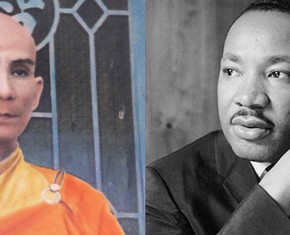The views expressed in our content reflect individual perspectives and do not represent the authoritative views of the Baha'i Faith.
If the soul identifies itself with the material world it remains dark, for in the natural world there is corruption, aggression, struggles for existence, greed, darkness, transgression and vice. If the soul remains in this station and moves along these paths it will be the recipient of this darkness; but if it becomes the recipient of the graces of the world of mind, its darkness will be transformed into light, its tyranny into justice, its ignorance into wisdom, its aggression into loving kindness; until it reach the apex. – Abdu’l-Baha, Divine Philosophy, p. 120.
I will never find the love of my life. Nobody wants to be my friend. My job stinks. My supervisor hates me. I am so depressed.
Do you find yourself having these kinds of dark, negative thoughts? You’re not alone. Did you know that research shows these thoughts can become more powerful than you think? What I’m about to share will make you think twice before saying or thinking something negative about yourself, others, or your relationships. Even better, this information has the power to change your life for the better.
Before I share the secret to turning your life around, let me start by emphasizing the fact that having negative experiences—and the thoughts that go with them—means you’re not alone. Everyone has to deal with those kinds of life events and the feelings that go with them. We all suffer through our tests and challenges. For example: many marriages end in divorce, an average of 47% of people report being unsatisfied with their jobs, and almost one in five people suffer from depression each year.
The good news? Research also shows that focusing on improving self-perceptions can reduce that depression. How? Well, we all have a personal, interior, private and ongoing conversation with ourselves. The Baha’i teachings sometimes refer to that faculty as our “inner eye” or our “inner ear:”
Incline your inner ears to the voice of the peerless and self-subsisting Lord, that He may deliver you from the bonds of entanglement and the depths of darkness and enable you to attain the eternal light. – Baha’u’llah, Tabernacle of Unity, p. 71.
In psychology, this inner conversation has a name: self-talk. Research shows self-talk has the power to actually shape our perceptions. The way we talk to ourselves influences how we view ourselves, how we view other people, and how we interact with others. Self-talk can change negative feelings such as shame, loneliness, and anxiety to feelings of pleasure, reassurance, and safety. Our thoughts also influence our self-esteem and self-confidence. Self-talk not only affects these emotions and characteristics, but also how we view our social reality.
Let’s use a real-life example. Say you participate in negative self-talk about your work. The inner reality your self-talk creates turns your work environment negative, so anything that happens at work is perceived negatively. When your supervisor suggests that you could manage your time better by talking less with your coworkers, you take that feedback negatively. This causes you to engage in negative self-talk about your supervisor and later tell your co-workers, which in turn causes everyone to engage in self-talk about each other, the supervisor, and the situation, and now everyone’s negativity influences each other’s thoughts and perceptions. Things can spiral out of control fast, right?
So what can break the cycle of negative self-talk at work, and improve your job satisfaction? Well, assuming another job isn’t an option, what you could do is focus on the aspects of your job that you actually enjoy, while minimizing your focus on the negative aspects. Yes, you read that right. Research shows that people can sometimes alter their original beliefs by simply seeing things from another perspective.
Actually, you practice this kind of self-persuasion all the time, although you may not realize it because self-persuasion works indirectly. Self-persuasion works more powerfully than direct types of persuasion like advertising, because the desire for change comes from within and causes us to believe we really want to change.
Let’s dig into the science behind self-persuasion. The process of self-persuasion can be explained using Leon Festinger’s theory of cognitive dissonance—that unpleasant feeling we experience when our behavior goes against our beliefs. This can help us understand why New Year resolutions don’t last very long. The New Year comes around and you’re extremely motivated, vowing that you’ll go to the gym every day. Sound familiar? Well, what happens when you accidentally miss a day or two? Naturally, you start feeling guilty—there is that cognitive dissonance—for not going to the gym every day.
So what do you do? According to cognitive dissonance theory, most people will get rid of this unpleasant feeling simply by altering their beliefs to harmonize with their behaviors. So in order to get rid of your unpleasant feelings of guilt, you instead convince yourself that the original desire to go to the gym every day was unreasonable to begin with, and wasn’t really a goal you desired anyway. Now you feel much better because your actions are in harmony with your beliefs.
But if you reverse that negative pattern, you can train your mind to do the opposite, focusing on the positive aspects of any situation and recognizing the good in others. This helps avoid cognitive dissonance, and allows your higher mental and moral principles to control your behavior, rather than the reverse. You can even, the Baha’i teachings say, concentrate your thoughts and feelings on the constructive aspects of life and help to create those conditions:
I charge you all that each one of you concentrate all the thoughts of your heart on love and unity. When a thought of war comes, oppose it by a stronger thought of peace. A thought of hatred must be destroyed by a more powerful thought of love. Thoughts of war bring destruction to all harmony, well-being, restfulness and content. Thoughts of love are constructive of brotherhood, peace, friendship, and happiness… – Paris Talks, pp. 28-30.
Clearly there must be something powerful about this kind of positive thinking! So if you find yourself engaging in negative thoughts, start using positive self-talk to change your life. Focus on the good and not the negative. Make time for some positive self-reflection and positive thinking—it will transform your life before your eyes.
You May Also Like
Comments

















I have been reading a book by Napoleon Hill from 1925, called The Law of Success. It talks about a lot of these things including self-talk and rebuilding habits and ways of thinking. Thanks, Andrea!